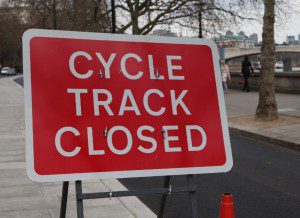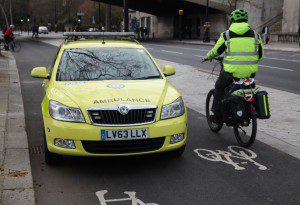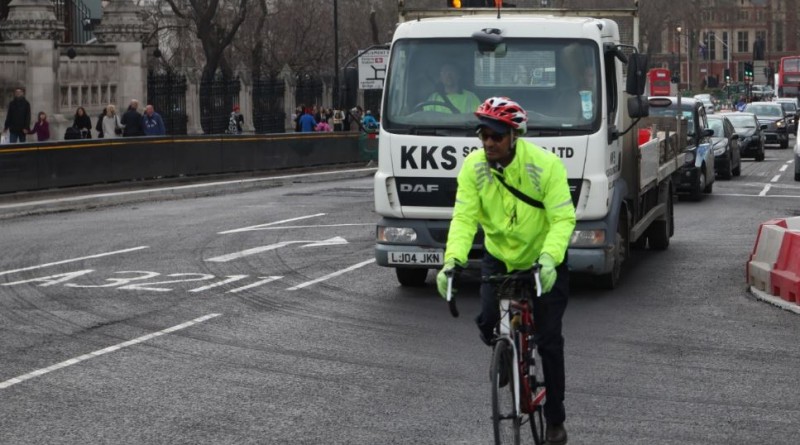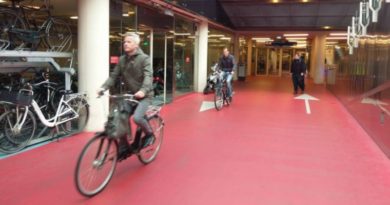Editor’s comment: House of Lords talk cycling, whole affair predictably depressing
On Monday Baroness Wilcox tabled a question in the House of Lords on the enforcement of traffic laws, in particular relating to pavement cycling.
It started a chain of anecdotes, mis-understandings and bingo card listed misconceptions that anyone familiar with British politics will find all too common and which ultimately makes one ponder, “how hard can i bang my forehead on this desk?”
Baroness Wilcox, who reportedly charges the taxpayer £5,700 a month for her 200 yard walk to work, kicked off with: “What assessment they (Her Majesty’s Government) have made of the extent to which general road traffic laws are enforced in respect of cyclists.”
Innocent enough a question, though you might think there are more pertinent things to discuss at present. Given the aformentioned cost of one MP’s travel bill, perhaps the house could ask why less is to be invested on safe cycling in the next five years nationwide than MPs will claim in expenses in just three years, for example.
Following a response from Lord Keen of Elie, in which she was reminded that cycling offences are a matter for chief officers of police, Wilcox followed with what was really bugging her.
“Does he agree that, at the very least, signs should be added for visitors who take bicycles in London and elsewhere warning them that it is illegal in Great Britain nationally to cycle on pavements and that they will be fined if they do so?” added the Baroness.
 Cyclists were responsible for four deaths on pavements between 2000 and 2010, according to data crunching by Cycling UK (CTC). Undoubtedly that figure is still too many, but motor vehicles claimed 40 lives on average annually in the same period – almost one a week.
Cyclists were responsible for four deaths on pavements between 2000 and 2010, according to data crunching by Cycling UK (CTC). Undoubtedly that figure is still too many, but motor vehicles claimed 40 lives on average annually in the same period – almost one a week.
Motor vehicles, of course, have a heavily invested in network of roads on which vulnerable road users are often forced to share. An equal share is paid to use these roads via council tax by cyclists, but safety is far from on par. Cyclists are only recently being handed meaningful infrastructure in the UK, though it varies wildly depending on your local authority. All things considered, context apparently isn’t important when choosing which topics to raise in Parliament.
As shown in the highly publicised MET’s Operation Safeway, such enforcement of cyclists on pavements does take place, often disproportionately.
Non pavement specific stats from the CTC data further showed that in the decade to 2012, cyclists killed 23 pedestrians. In that same ten year spell, motor vehicles were involved in an astonishing 3,330 pedestrian deaths.
Pavement cycling was just the start of the dialogue. In came the anecdotes, courtesy of Baroness Wall of Barnet who seems to inadvertently admit to running over a cyclist…
“Is the Minister aware of how many cyclists know the traffic laws that they are supposed to be adhering to? I know that my next question will split the House completely according to whether one is an avid cyclist, but a cyclist came right in front of me and hit my car, so what insurance would he have for me to claim against?”
Let’s start with the physics of this one. A cyclist in front of Wall’s car hit her. Was that cyclist busting what is known in BMX circles as a ‘fakie’, i.e. travelling backwards?
The cyclist, who is presumably fairing worse after the encounter with approximately two tons of metal, isn’t unique in this kind of debate. Bizarrely, the House has previously congratulated Baroness Sharples who admitted to hitting a cyclist on the back, so err… move along people, nothing to see here.
Trickling down to the courts and a high profile QC recently mooted that such a pack mentality may also be present in juries when dealing with vulnerable road user cases. Furthermore, city barristers are now advocating a move against cycle superhighway extension because Hollywood revenues might be damaged. Really.
Putting aside the estimated 1.2 million cars on the road driven without insurance, despite registration, let’s look again at the case for insurance for cyclists.
British Cycling data suggests that 90% of its members (all of which gain liability insurance in their sign up) also drive cars. That further means that many cyclists are already covered under either their motoring, or at the very least, household insurance.
Depressingly, this is far from the first time a Government official has suggested cyclists should be registered. Infamously, Labour MP Kate Hoey penned a column on Lycra Louts being endemic law breakers, only to then receive a fine for running a red light in her car. Since then Hoey has re-iterated her stance on number plates for cyclists.
Which brings us on to the next point raised in the Lords this week. Lord Berkeley pointed to cyclists being fined for breaching stop lines, but asked are cars able to be fined for entering advanced boxes dedicated to cyclists at traffic lights. 
“I do not believe it is unfair on cyclists,” replied Lord Keen of Elie. “One has to remember that in the case of the vehicle, registration can be traced. In the case of the cyclists there is no registration, and therefore an on-the-spot fine is more appropriate.”
As any city cyclist will testify, enforcement of motor vehicles in such ASLs is rock bottom, regardless of registration and in some cases, seemingly not fully understood or even recorded by local police forces.
If Baroness Jenny Jones, a cycling advocate and Green MP wasn’t in the room to bring some context to the whole debate, we get the feeling that the cycling bingo card might have been played in full.
The Baroness, in steering the discussion away from anecdotes on assumptions that it’s just cyclists running reds, said: “My Lords, I am sure the Minister is well aware that the Transport Committee of the House of Commons said last month that it was very concerned about the ever-increasing number of pedal cyclist casualties, which has gone up by 8.3% in the past year. What are the Government doing to reverse that trend?”
“I think that the noble Baroness should bear in mind that there has been a marked increase in the number of cyclists on the roads in the past years as well, which is not inconsistent with the increase in the number of incidents,” retorted Lord Keen.
So, let’s carry on allowing both sets of figures to grow in tandem, then?
Given the wealth of evidence available to support safe and segregated infrastructure for cyclists, perhaps next time such a debate crops up this might be the focal point of discussion. We can dream of a sensible and factual debate once in a while, can’t we?
You can read the exchange in full here.



